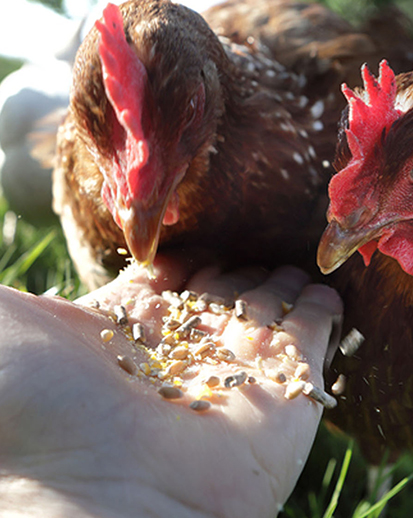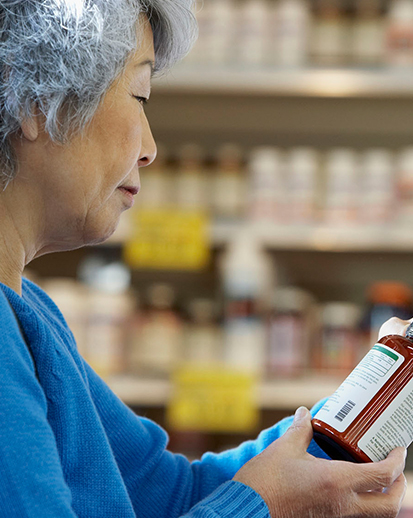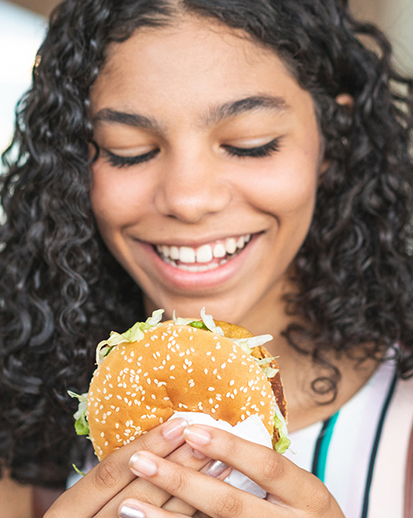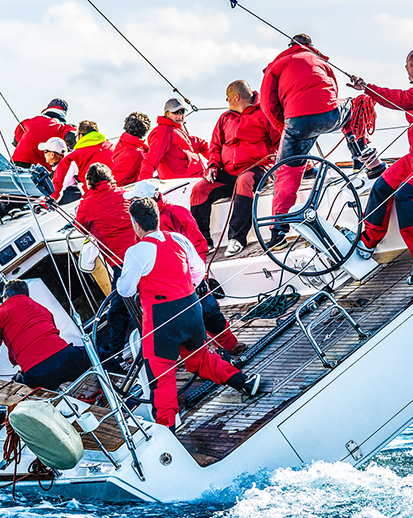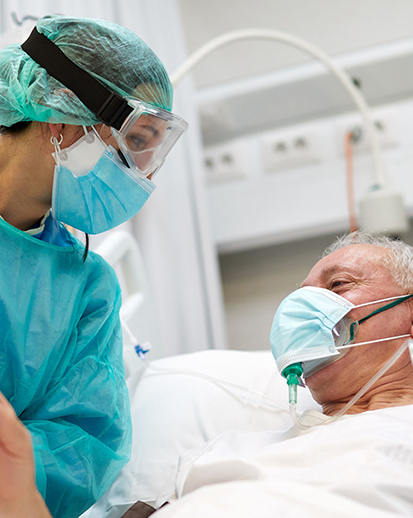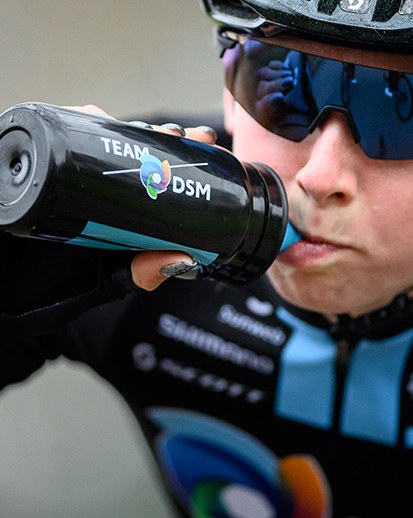Animal Nutrition & Health
About Animal Nutrition & Health
Animal Nutrition & Health serves the global feed industry with innovative and sustainable nutritional solutions. A pioneer since the earliest days of feed additives, we draw on the latest science to provide a unique portfolio that runs from vitamins through carotenoids to cutting-edge mycotoxin risk management solutions, feed safety diagnostic solutions, eubiotics, and feed enzymes. We aim to make animal farming more sustainable by reducing GHG emissions and the pressure on the environment. At the same time, we strive to ensure that farmers can earn a decent living and that people will have access to affordable proteins. For more information on our Animal Nutrition & Health strategy and how we make animal farming more sustainable can be found in the Nutrition strategy section.
Animal Nutrition & Health performance
Animal Nutrition delivered 8% organic growth, equally driven by volume and price. The first quarter saw a strong COVID-19 accelerated purchasing effect that faded through the second and third quarters as customers unwound their inventories. In the fourth quarter, volumes were normalized at 5%.
Poultry saw good sales growth overall with increased demand as the COVID-19 lockdowns triggered higher demand for easy-to-prepare proteins. This growth was partly offset by softening demand in some emerging economies due to a general loss of household income. Pork saw good demand with production in China picking up as the effects of African Swine Fever recede and the steady rebuilding of the swine population continues with increased professionalization of farming. Together with regulatory changes in China that require the reduction of the use of antibiotics in animal feed, these developments strengthen our value proposition in the Chinese market with its higher value-added nutrition and gut health solutions.
While global beef and aquaculture demand were in general soft due to their significant exposure to food service channels, We performed well in these categories. We saw good sales growth in ruminants as Brazilian beef exports remained strong and demand for farmed salmonids was solid. Pet food saw strong demand throughout the year.
Erber Group, which was consolidated from the fourth quarter of 2019, made a strong contribution in its first quarter within DSM, realizing €81 million sales, with a total Adjusted EBITDA of €18 million.
Chicken and eggs: an important protein source during COVID-19
Our close collaboration with our poultry customers around the world to protect the supply of key micronutrients and nutritional additives to broiler flocks resulted in a good performance for the year. Eggs played an important role in providing consumers with quality protein during COVID-19. Our partnership with the International Egg Commission (IEC) led to the development of working groups on sustainability and egg nutrition in 2020. This approach delivered improved annual sales of our egg solutions.
Successful navigation of African Swine Fever (ASF) crisis
African Swine Fever (ASF) is one of the severest crises experienced by animal farming in recent times. We navigated it well during 2020, thanks to our integrated and diversified business model. Managing ASF has called for improved biosecurity, the accelerated adoption of technology, and an increased level of professionalization across the entire pork industry. DSM is benefiting from these industry developments, not only in China but also in other countries, such as Vietnam and the Philippines.
Drive for more sustainable aquaculture and growing interest for sustainability in pet food
The drive for more sustainable aquaculture continues, and we are well placed to capitalize on this with our purpose-led innovation activities and our nutritional products and solutions portfolio.
Ruminants: focus on feed efficiency and immunity
The year 2020 was marked by a strong focus on raw material utilization and feed efficiency in beef production in the US and Brazil; significant engagement from dairy producers in the areas of lifetime performance, immunity and fertility programs in Europe, the US, Brazil and East Asia; and growing uptake for our rumen performance solutions addressing antimicrobial resistance in Europe, South America and China.
Expansion of production in China
In November, we announced the opening of our seventh Animal Nutrition & Health premix plant in China, situated in Baishazhou Industrial Park, Hengyang City (Hunan Province, China). This latest facility brings together our advanced processes and innovative solutions to promote sustainable animal protein production in the Chinese market. The opening of the new plant also marked the official launch of the first DSM Vitamins Academy. Serving as a new platform for market outreach and education, the Academy will share the latest scientific research and practices with players across the animal feed and husbandry value chain.
The vitamin E plant owned by the DSM–Nenter joint venture (Yimante) in China started production at the end of December 2020. Output is planned to gradually ramp up during the course of 2021.
Acquisition of Biomin and Romer Labs
On 1 October 2020, we acquired Erber Group’s Biomin and Romer Labs. Erber Group’s specialty animal nutrition and health business, Biomin, specializes primarily in mycotoxin risk management and gut health performance management, while the Romer Labs business focuses on food and feed safety diagnostic solutions. The acquisition expands our range of higher value-add specialty solutions and further strengthens our expertise and reputation as a leading provider of animal health and nutrition solutions for farm productivity and sustainability, with an emphasis on emissions reduction, feed consumption efficiency, and better use of water and land.
Ramping up production of Veramaris® algal-based omega-3
We had commenced commercial-scale production of algal-based omega-3 at our Veramaris facility in Blair (Nebraska, USA) in 2019. Our proprietary technology delivers a breakthrough in the cultivation of marine algae naturally rich in EPA and DHA omega-3, facilitating production on an unprecedented scale. In 2020, we started to generate sales and began ramping up output from this facility. We additionally started work on incorporating Veramaris® into feed for additional species such as shrimp, as well as into pet food. Veramaris was chosen as the omega-3 partner by Feed-X, the feed innovation accelerator founded by the World Wildlife Fund (WWF) which aims to see 10% of the global feed industry adopt alternative feed ingredients into value chains.
Combating emissions from ruminants with Bovaer®
We commenced the process of registering our Bovaer® methane inhibitor solution in Europe, entering into dialogue with the European Food Safety Authority (EFSA) subsequent to the submission of the registration dossier in 2019. Bovaer® is the most extensively studied and scientifically proven solution to the challenge of enteric (burped) methane from ruminants to date. We were pleased that at the end of 2020, a two-year large-scale trial in beef cattle in Alberta (Canada) successfully demonstrated that Bovaer® can be included in commercial feedlot diets to reduce methane emissions by up to 80%, without negative effects on animal health and performance. Over the past ten years, 35 on-farm beef and dairy trials have been conducted across the globe, delivering convincing data from over 10,000 animals and in the context of various feeding systems. A further positive development was the announcement of the collaboration agreement with VALIO to significantly reduce the carbon footprint of dairy production in Finland.
Enabling the replacement of antibiotic growth promoters (AGPs)
Balancius™, developed together with our long-term alliance partner Novozymes, is an innovation that helps farmers tackle the issue of antimicrobial resistance (AMR). Balancius™ supports digestion and gastrointestinal functionality and improves animal performance. In 2020, the Chinese Ministry of Agriculture, for example, introduced legislation to withdraw antibiotic feed additives as growth promoters. This move was positive for innovations such as Balancius™, but also for our existing eubiotics solutions, such as VevoVitall®, which combats the negative activity of micro-organisms on feed.
Development of Sustainability Service and Precision Nutrition platform
Effective measurement at farm level is essential to enable farmers to work on sustainability topics. The same applies for Precision Nutrition; helping farmers to improve the efficiency and effectiveness of their farm practices. To this end, in 2020, we started developing a service that enables farmers to see their own environmental footprint in its entirety. Providing this level of transparency will create opportunities for farmers to reduce emissions and differentiate themselves from less sustainable competitors. Additionally, we made good progress in advancing our Precision Nutrition platform in poultry in the USA to facilitate diagnostic testing to address health challenges.


